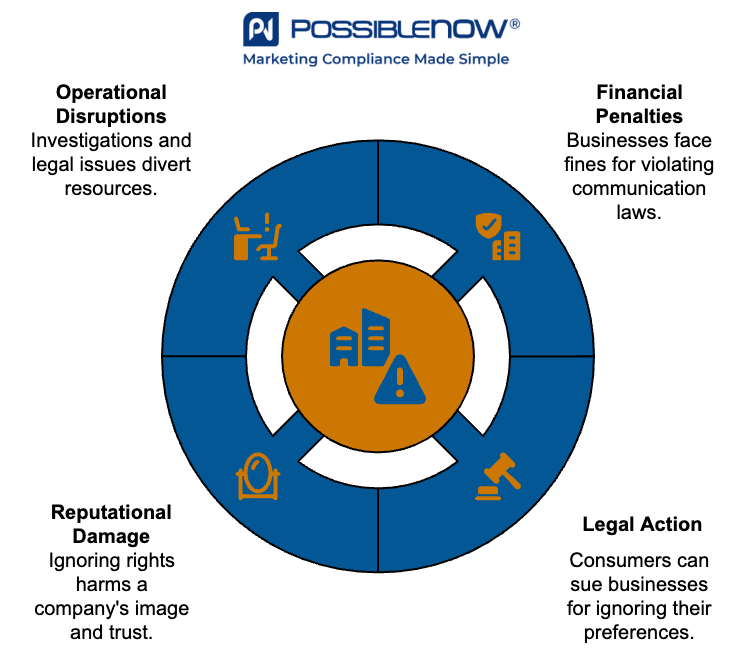Resource Center
7 Essential Consumer Rights Under Do Not Contact Laws
Type: Blog
Topic: Do Not Call Solution

Consumers today are targeted across channels, including phone, text, email, and beyond. To protect privacy and prevent unwanted outreach, laws like the TCPA, TSR, CAN-SPAM, and GDPR give individuals specific rights that businesses must follow. These rights define when, how, and if a company can reach out for marketing purposes. Failing to respect them can result in serious penalties and loss of trust.
In the following sections, you’ll find information on:
Speak With an Expert Today
Here’s a breakdown of the most important rights consumers have under Do Not Contact laws and what businesses must do to honor them.
The Right to Opt Out of Marketing Communications
Consumers can ask businesses to stop contacting them through any marketing channel, including phone calls, text messages, emails, or, as applicable, direct mail . Opt-out requests can be made by replying “STOP” to a text, clicking an unsubscribe link in an email, telling a caller directly, or submitting a request through a company’s website. Once a request is made, businesses are required to process it promptly and avoid future contact
The Right to Be Listed on the National Do Not Call Registry
Consumers can add their phone numbers to the National Do Not Call Registry to block most unsolicited telemarketing calls. However, some types of calls are still allowed. These include outreach from political organizations, charities, and companies with which the consumer has an existing business relationship. For sales-related calls, telemarketers are legally required to check the registry and avoid contacting listed numbers.
The Right to Revoke Consent at Any Time
Even if a consumer has previously agreed to receive marketing communications, they can withdraw that consent at any time. Businesses must respect such revocations and cease further outreach.
The Right to Be Free From Automated Contact Without Consent
Under the Telephone Consumer Protection Act (TCPA), businesses must obtain prior express written consent before using autodialers or prerecorded messages to contact consumers by phone or text. This consent must be given voluntarily and in writing. In most cases, this involves the consumer filling out a form or selecting an unchecked box that explicitly states they agree to receive marketing calls or texts. Businesses are also required to keep a record of that consent in case they need to prove it was obtained.
The Right to Receive Communications Only During Permitted Hours
Telemarketing calls are restricted to the hours between 8 a.m. and 9 p.m. local time. Contacting consumers outside of these hours is generally prohibited.
The Right to Know How Personal Data Is Being Used
Some privacy laws give individuals the right to request information about how their personal data is being collected, shared, and stored, particularly when that data is used for marketing. This right is clearly defined under laws like the General Data Protection Regulation (GDPR) in the EU and the California Consumer Privacy Act (CCPA). These laws require businesses to explain the purpose of data collection, the categories of data collected, and whether the data is sold or shared with third parties.
While this right is not yet guaranteed nationwide in the U.S., it is becoming more common under state-level privacy laws. As a result, many companies choose to provide this level of transparency to all consumers, regardless of location.
The Right to File Complaints and Seek Redress
If consumers believe their rights have been violated, they can file complaints with regulatory bodies such as the Federal Trade Commission (FTC) or the Federal Communications Commission (FCC). These agencies can investigate and enforce penalties against non-compliant businesses.
What Happens If Businesses Violate These Rights?

Non-compliance with Do Not Contact laws can lead to significant consequences for businesses, including:
- Financial Penalties: Violations of the TCPA can result in fines of up to $1,500 per infraction.
- Legal Action: Consumers may file lawsuits against businesses that disregard their communication preferences.
- Reputational Damage: Ignoring consumer rights can harm a company’s reputation and erode customer trust.
- Operational Disruptions: Regulatory investigations and legal proceedings can divert resources and focus from business operations.
How PossibleNOW Helps Businesses Respect Consumer Rights
PossibleNOW offers comprehensive solutions to help businesses manage consumer communication preferences and comply with Do Not Contact regulations:
- MyPreferences® enables enterprises to collect and manage customer consent and preference data across all channels and business units. It integrates with existing systems to help organizations honor permissions consistently and in real time.
- DNCSolution® automates list scrubbing against the National DNC Registry and internal suppression lists, helping reduce risk across outbound calling campaigns.
- TCPA compliance services support lawful outreach by managing consent records, processing revocations, and aligning with key requirements for marketing calls and texts.
By leveraging these solutions, businesses can build trust with consumers and reduce the risk of regulatory penalties. Reach out today to schedule a free demo.
Request a Demo Today
About PossibleNOW
PossibleNOW is the pioneer and leader in customer consent, preference, and regulatory compliance solutions. We leverage our MyPreferences technology, processes, and services to enable relevant, trusted, and compliant customer interactions. Our platform empowers the collection, centralization, and distribution of customer communication consent and preferences across the
enterprise. DNCSolution addresses Do Not Contact regulations such as TCPA, CAN-SPAM and CASL, allowing companies to adhere to DNC requirements, backed by our 100% compliance guarantee.
PossibleNOW’s strategic consultants take a holistic approach, leveraging years of experience when creating strategic roadmaps, planning technology deployments, and designing customer interfaces. PossibleNOW is purpose-built to help large, complex organizations improve customer experiences and loyalty while mitigating compliance risk.
-
TCPA Regulations and Compliance: Complete Guide
Type: Blog
Topic: Do Not Call Solution
-
Defining Meaningful Metrics: 6 Soft KPIs to Measure Customer Preference Collection
Type: Blog
Topic: Preference Mgmt
-
Email Preference Center Best Practices
Type: Blog
Topic: Preference Mgmt
-
The Basics of DNC Scrubbing: What Is a Do Not Call (DNC) Scrubber and Why Do You Need It?
Type: Blog
Topic: Do Not Call Solution
-
What is Consent Management, How it Works, & Why it’s Important for Data Compliance
Type: Blog
Topic: Consent Mgmt
-
Do Insurance Companies Cover TCPA Damages?
Type: Blog
Topic: Do Not Call Solution
-
8 Best Practices for Capturing GDPR Consent
Type: Webinars
-
Data Silos Cause Communication Gaps
Type: Videos
Topic: Preference Mgmt
-
Difference Between Preferences & Consent
Type: Videos
Topic: Preference Mgmt
-
Integrate Do Not Call Compliance with Preferences
Type: Videos
Topic: Preference Mgmt
-
Customer Preferences Require More Than One Flavor
Type: Videos
Topic: Preference Mgmt
-
Give Customers Opt-Down Options
Type: Videos
Topic: Preference Mgmt
-
Preference Center Organization
Type: Videos
Topic: Preference Mgmt
-
Strategic Consultants Benefited Scotiabank
Type: Videos
Topic: Industry Testimonials
-
Best Practices for Managing Do Not Email Lists
Type: Blog
Topic: Do Not Call Solution
-
How Do Not Call Rules Apply to Nonprofit Organizations
Type: Blog
Topic: Do Not Call Solution
-
How to Train Your Call Center on DNC Rules
Type: Blog
Topic: Do Not Call Solution
